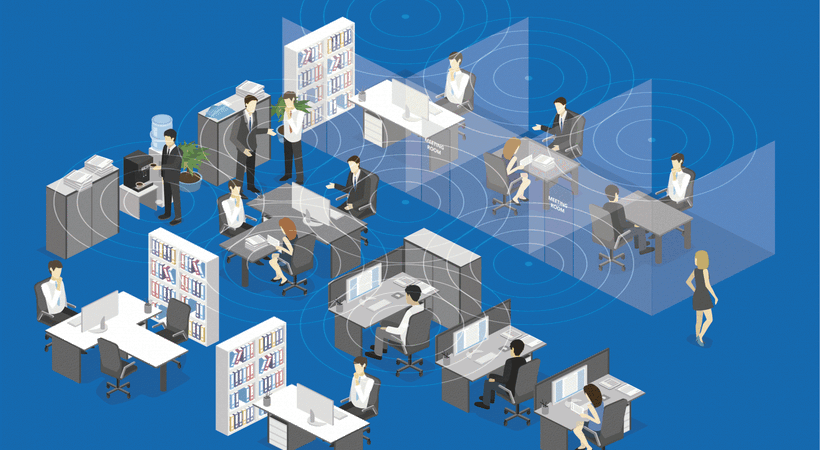Noise in the workplace is having a negative impact on the wellbeing of employees and impacting significantly on their productivity, according to a new survey ‘Noise and Wellbeing at Work 2019’ by intelligent business solutions company The Remark Group, supported by environmental psychologist and workplace strategist Dr Nigel Oseland, an honorary senior lecturer at UCL’s Institute for Environmental Design and Engineering.
In the survey of 1,000 UK-based office workers, 65% reported that noise in the workplace impacted on their ability to complete work in an accurate and timely manner. Nearly half (44%) said that noise had a negative impact on their overall wellbeing, with over 40% reporting that noise at work caused them to feel stressed.
Interestingly, the survey highlighted that 52% of people report they are interrupted by noise distractions more than five times in a working day, with 17% stating that they are interrupted by noise more than 10 times a day.
Recent research suggests that every time we are interrupted, it takes 15 minutes to get back in a state of focus. This could mean over an hour of wasted time each day for over half of the workforce, contributing significantly to lost productivity.
Dr Nigel Oseland said: “Remark’s research shows that noise is the biggest cause of dissatisfaction in the modern workplace, along with an associated loss of performance, increases stress and poorer wellbeing.
“As more companies are adopting open plan design and agile working, the core challenge to the workplace community, designers and suppliers is to resolve office noise distraction and enhance focussed work, whilst maintaining collaborative and creative environments. Remark’s research and services contribute to providing the solution.”
Sixty-four per cent of workers surveyed reported that they often suffer from a lack of privacy at work, with over half (51%) stating that they have overheard confidential or sensitive information being discussed in the office and nearly 70% have overheard a colleague being upset or distressed.
Over half of employee’s state that they are reluctant to speak about a confidential, business-sensitive or personal issue at work, for fear of being overheard, with 41% feeling anxious about being overheard and 45% reporting they feel anxious about hearing something they shouldn’t.
According to the survey, sudden bursts of noise are the most irritating in the workplace, with the most annoying being: colleagues’ telephone conversations (74%); personal conversations (65%); sudden laughter (62%); telephone ring tones (58%); doors slamming (56%); eating noises (55%); business conversations (53%); coughing/sneezing/sniffing (50%) and music (40%).
It is therefore no surprise that half of the workforce (46%) admit to having worn headphones in the office to block out or reduce noise distractions.
The office environment is incredibly important to employees, with 64% of employees reporting it impacts on their motivation to work and 42% stating that their workplace doesn’t encourage productivity.
Sixty-five of UK office workers state that the workplace environment would impact on their decision on accepting a job offer whilst a massive 80% report a good working environment would affect their decision to stay with a company.
The Remark Group specialises in designing and installing sound masking systems and solutions in offices throughout the UK, with contracts having included embassies, legal firms and NHS facilities.
Penelope Harrall of the Remark Group said: “Roughly half of the UK work in open plan office environments, a system which was initially designed to encourage communication and collaboration between employees. Yet, with this design comes an increase in annoying and distracting workplace sounds, such as telephone ringtones, sudden bursts of laughter and phone conversations. These are proven to be distracting and have profound effects on employee stress levels and wellbeing, not to mention the impact they have on loss in productivity.
“Compulsory in any new-build offices in the USA, sound masking systems operate to reduce both general office noises and conversational distractions, even in an open plan environment, and in turn increase performance levels, eliminate distractions and enhance the overall wellbeing of employees.”





